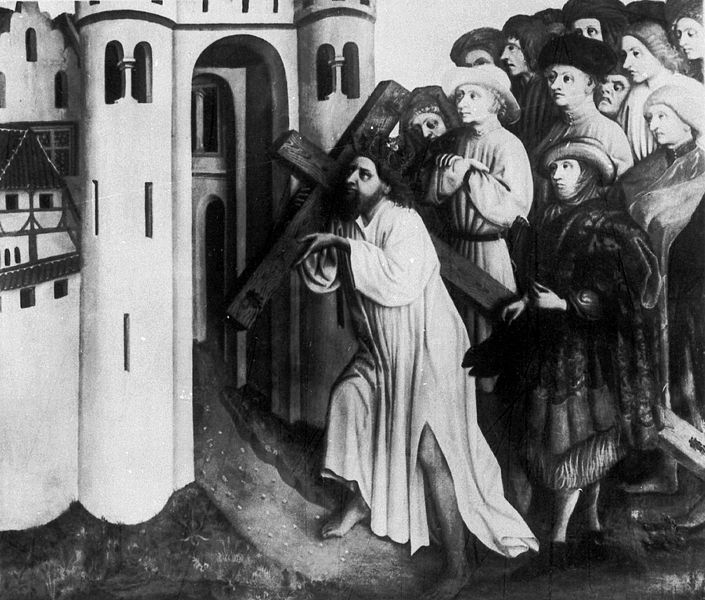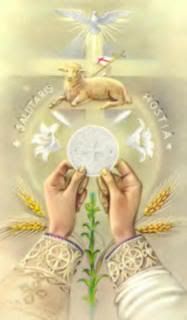This story is so interesting that I shamelessly ripped it from the Aquinas & More Catholic Goods newsletter. Saint Helen is my patron saint, as well.
First, a quick quiz:
The true cross was carried through Jerusalem by ______.
A. Christ
B. Simon of Cyrene
C. The Holy Roman Emperor
D. All the Above
Every Christian and non-Christian alike knows that Our Lord carried the cross through Jerusalem, and if you've ever said the Stations of the Cross then you probably know that Simon of Cyrene was coerced into helping Him for part of the way. What you might not know is that the True Cross would one-day be carried through the streets again on the back of the Holy Roman Emperor.
There is a fascination with the True Cross that on some levels exceeds other mysterious artifacts like the Ark of the Covenant and the Holy Grail and the legend is better than anything Spielberg could concoct. Monsignor Ronald Knox says of the cross that it bears many symbolic similarities with things in the Old Testament. It reminds us of the Ark, the healing serpent of Moses, and the tree in Eden.
 The first legend says that when Adam lay on his death bed, the Archangel Michael appeared to his son Seth and gave him a seed from the Tree of Knowledge of Good and Evil. Seth placed this seed in the mouth of Adam when he was buried.
The first legend says that when Adam lay on his death bed, the Archangel Michael appeared to his son Seth and gave him a seed from the Tree of Knowledge of Good and Evil. Seth placed this seed in the mouth of Adam when he was buried.
From Adam's mouth grew a tree which was chopped down centuries later. For an unknown reason, the wood couldn't be used for anything so it was thrown across a river to serve as a bridge. On her journey to see Solomon, the Queen of Sheba was approaching this bridge when she received a vision which prephesied that Our Saviour would one day hang upon this wood. The queen hurried to King Solomon to tell him the story, which he immediately understood as a warning message.
Solomon feared that the death of the Messiah would also mean the destruction of his kingdom so he ordered that the tree be removed from the river and hidden. But a thousand years later the wood was found and it was used to make the Cross.
 After Our Lord's crucifixion, the Emperors saw Christianity as a threat and tried to eradicate the memory of the Passion from people's minds by building over the places of veneration. By the early second century Golgotha was no longer a desolate hill top used for executions. Instead there stood a statue of Jupiter and a temple to Venus where pagans offered their sacrifices.
After Our Lord's crucifixion, the Emperors saw Christianity as a threat and tried to eradicate the memory of the Passion from people's minds by building over the places of veneration. By the early second century Golgotha was no longer a desolate hill top used for executions. Instead there stood a statue of Jupiter and a temple to Venus where pagans offered their sacrifices.
It was in 313 after the Edict of Milan had been signed that Christianity became legal again in the Roman Empire. Emperor Constantine received a vision of a cross high in the sky and saw the words, “By this sign you shall conquer.” Enthusiastic about the promise, Constantine sent his mother, Helen, to Jerusalem to find the Cross which had not been seen for three hundred years.
In Jerusalem there was only one man who knew where the cross was hidden: a Jew by the name of Judas. After heavy persuasion the Jewish man revealed that the cross was buried under the temple of Venus. Dedicated to her mission, St. Helen ordered the demolition of the temple and the excavation of the ground underneath.
![]() They found the tomb of Christ and only a short distance away, instruments of the Passion and all three crosses used on Calvary that day. Legend says that the True Cross was exposed by touching the crosses to a boy who had just died. When the True Cross touched the boy, he was brought back to life.
They found the tomb of Christ and only a short distance away, instruments of the Passion and all three crosses used on Calvary that day. Legend says that the True Cross was exposed by touching the crosses to a boy who had just died. When the True Cross touched the boy, he was brought back to life.
This miraculous event was witnessed by many and caused many Jews, including Judas, to seek baptism. (Judas quickly changed his name to Kyriakus.) He would eventually be appointed bishop of Jerusalem and suffer a martyr's death under the tyrannical reign of Julian the Apostate in 363.
Upon the excavation site, Constantine ordered that a Christian church be built to house the venerable relics. The Church of the Holy Sepulcher was built and would be consecrated on September 13, 335.
For three hundred years the cross sat in peace until the Persian Emperor Khosrau II defeated the Roman army and sacked the holy city of Jerusalem and turned thousands of Christians into slaves. Among the plundered items were the instruments of the Passion and the Holy Cross. The relics remained in exile for fourteen years when in 627 Emperor Heraclius conquered the Persian army and recaptured the Cross. (Some sources indicate that he received the Cross as part of the negotiations after the war.)
In any case, the Emperor returned to Jerusalem to reinstate the Cross with great fanfare.  The legend says that Heraclius was initially going to carry the Cross by horseback, but as he entered the city, the weight became too great. It was only after he attempted to bear the weight himself that it was light enough to carry.
The legend says that Heraclius was initially going to carry the Cross by horseback, but as he entered the city, the weight became too great. It was only after he attempted to bear the weight himself that it was light enough to carry.
Then, when he reached the gates Golgotha, he found his way blocked by an angel. The angel said that since Christ carried the Cross in all humility, he must follow in the same manner. When he had removed his golden crown, purple robes and shoes, the way was opened and he was able to carry the Cross into the church.
Little is known about the True Cross after this period. Splinters of it were dispersed and can be found wherever Christians are found. The largest pieces can be found in Notre Dame, Pisa Cathedral, Florence Cathedral, and Santa Croce in Rome.





































